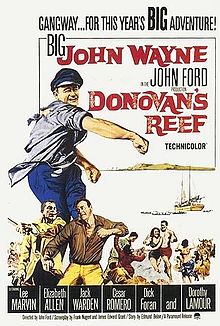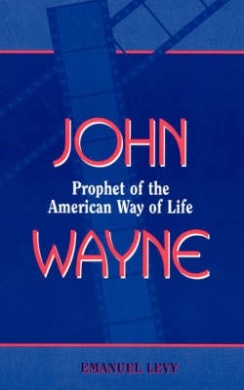Like other John Wayne movie, the propaganda in McLintock!” a Western comedy, is not limited to the political domain but also contains a sociological one that’s more pervasive, embracing all aspects of life.

Based on James E. Grant’s screenplay, this movie is significant because it marks the beginning of Wayne’s attempt to impose his general views, not just political ones, on his pictures. Most of Wayne’s screen work after = McLintock” would express his opinions about education, family, economics, and even friendship.
The yarn’s hero is George Washington McLintock, a self-made cattle baron, banker, and leading citizen who rules a town named after him. Ageless, he commands respect and authority, because, as one man says, “He has earned it.”
Read our review of John Wayne’s Donovan’s Reef, made I the same year.
https://emanuellevy.com/wp-admin/post.php?post=9196&action=edit

Significantly, the sign on the railroad depot reads: “McLintock. Six Thousand Feet Above Sea level.” McLintock plans to leave his property to the nation to become a national park. But the movie is all about respect for authority. McLintock demands respect from the town’s youngsters: “Mostly men my age call me Mac or McLintock. Youngsters call me Mr.
McLintock.”
The movie expresses Wayne’s conservative politics and laissez-faire economics, defending the possession of wealth as long as it is in the hands of “responsible citizens.” And it also reflects the actor’s belief in hard work, fair play, and competitiveness.
When a young man tells McLintock, “Of course, I should have been grateful, you gave me a job,” he snaps at him, “Gave Boy, that’s all wrong. I don’t give jobs. I hire men. You intend to deliver me a fair day’s work every day, don’t you And for that, I’ll pay you a fair day’s wage.” McLintock also makes sure that the norms of their contractual agreement are clear: “You’re not giving me anything, and I’m not giving you anything. We both hold up our heads.”
McLintock is in favor of establishing statehood as a means of disposing the political appointees who run the town inefficiently, reflecting Wayne’s alleged contempt for politics and politicians. The Governor’s name, Guthert H. Humphrey, is of course a less-than-subtle reference to the late Minnesota Senator Hubert Humphrey, whose democratic politics stood in sharp opposition to Wayne’s in the 1960s.
In his first encounter with his estranged wife (Maureen O’Hara), McLintock tells her that he has seen a photograph of her dancing with the Governor. Her description of the Governor as a gentleman irritates him: “You have to be first a man, then a gentleman. The Governor misses on both counts.”
McLintock!” also reflects Wayne’s view of government. When one of the settlers tells him “the Government gives us each a hundred and sixty acres,”
Wayne replies, “No government ever gave anybody anything.” “Governments are in the business of taking away from people,” he explains, “not giving.”
This laissez-faire philosophy was also expressed by Wayne off screen. “I don’t want any handouts from a benevolent government,” he said in an interview around that time, “I think government is naturally the enemy of the individual, but it’s a necessary evil like, say, motion-picture agents are.” Wayne’s political credo, “I do not want the government to take away my human dignity and insure me anything more than a normal security.”
Of greater significance is McLintock’s suspicion of higher education and academicians. He describes the political appointees as “running the country
according to what they learned in some college, where cows are something people milk, and Indians are statues in front of cigar stores…” In another scene, McLintock is labeled a reactionary by the college-educated son of a politician.
Wayne is engaged in a conflict with his separated wife over the custody of their seventeen-year-old-daughter, who’s attending college in the East. This provides an opportunity for the juxtaposition of Eastern and Western ways of life, a recurrent issue in many of Wayne’s Westerns. When his daughter is courted by two rivals, Wayne’s cowhand and a Harvard University student, she chooses, of course, the cowhand, thus pleasing he dad and reaffirming his way of life.
If you want to know more about John Wayne. please read my book:











